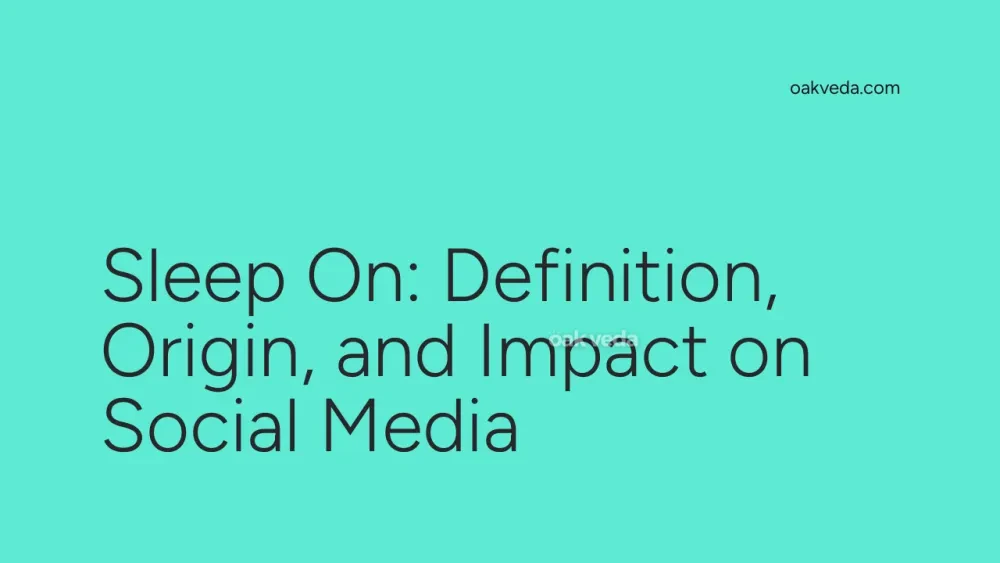
What is "Sleep On"?
"Sleep on" is a popular phrase used in social media contexts, often in the form of "don't sleep on." This expression serves as a call to action, urging users not to overlook or underestimate the value of a particular person, idea, product, or piece of content. Essentially, it's a way of saying, "Pay attention to this; it's worth your time."
Origin and Development of "Sleep On"
The phrase "sleep on" has its roots in African American Vernacular English (AAVE) and hip-hop culture. While the exact origin is difficult to pinpoint, it gained prominence in the early 2000s within music communities. As social media platforms evolved, the term transitioned from niche usage to mainstream adoption, becoming a staple in online communication.
How "Sleep On" Works
When someone uses "don't sleep on" in a social media post, they're advocating for something they believe deserves more recognition. This could be:
- An up-and-coming artist
- A new song or album
- An innovative product
- A thought-provoking idea
- An emerging trend
The phrase works by creating a sense of urgency and exclusivity. It suggests that the audience might miss out on something valuable if they don't pay attention.
Popular Examples of "Sleep On"
- Music Promotion: "Don't sleep on this new album by [Artist Name]. It's fire! 🔥"
- Product Recommendations: "Y'all sleeping on these noise-canceling headphones. Game-changer for WFH!"
- Content Creation: "Don't sleep on TikTok for business. The organic reach is insane right now."
- Career Advice: "Sleep on this job opportunity and you might regret it. It's a once-in-a-lifetime chance!"
Impact of "Sleep On" on Social Media Culture
The "sleep on" phrase has significantly influenced how users share and discover content on social media platforms. Its impact includes:
-
Accelerated Trend Adoption: By encouraging users to pay attention to new trends, the phrase can speed up the viral spread of content.
-
Community Building: It fosters a sense of insider knowledge, creating communities around shared interests and discoveries.
-
Influencer Currency: The ability to spot and promote the "next big thing" has become a valuable skill for influencers, with "don't sleep on" as their rallying cry.
-
Content Curation: The phrase helps in curating content, guiding users towards what's considered valuable or noteworthy within specific communities.
-
FOMO Culture: "Sleep on" plays into the fear of missing out (FOMO), motivating users to stay constantly engaged with the latest trends and content.
How Brands and Influencers Use "Sleep On"
Savvy brands and influencers have incorporated "sleep on" into their social media strategies:
- Product Launches: Brands use the phrase to create buzz around new releases.
- Limited-Time Offers: It's employed to drive urgency for time-sensitive promotions.
- Influencer Collaborations: Influencers use it to highlight partnerships or products they genuinely believe in.
- Content Strategy: The phrase helps in positioning content as must-see or must-read.
Future Trends Related to "Sleep On"
As social media evolves, so does the usage of phrases like "sleep on":
- Platform-Specific Variations: Different platforms may develop their own versions or interpretations of the phrase.
- AI-Driven Recommendations: Future AI algorithms might incorporate the sentiment behind "don't sleep on" to improve content recommendations.
- Augmented Reality Integration: AR features could allow users to tag real-world objects or locations with "don't sleep on" markers.
- Personalized "Don't Sleep" Feeds: Platforms might create curated feeds of content that users shouldn't "sleep on" based on their interests and behavior.
FAQs about "Sleep On"
-
Is "sleep on" only used for positive recommendations? Generally, yes. It's typically used to highlight something the user considers valuable or positive.
-
Can brands overuse the "don't sleep on" phrase? Yes, overuse can lead to audience fatigue. It's most effective when used sparingly and authentically.
-
Is "sleep on" appropriate for all social media platforms? While it's widely understood, it's more common on platforms with younger demographics like TikTok, Twitter, and Instagram.
-
How can I use "sleep on" effectively in my social media strategy? Use it sparingly for truly noteworthy content or products. Authenticity is key to maintaining credibility with your audience.
-
Are there any alternatives to "don't sleep on"? Yes, phrases like "You need to check out," "This is a must-see," or "You're missing out if you haven't seen" convey similar sentiments.
In conclusion, "sleep on" has become a powerful tool in the social media lexicon, driving engagement, discovery, and trend adoption. As online communication continues to evolve, understanding and appropriately using phrases like this can significantly enhance one's social media presence and influence.
You may be interested in:
- Chatbot: Definition, Origin, and Impact on Social Media
- Crispy R: Definition, Origin, and Impact on Social Media
- Quiet Quitting: Definition, Origin, and Impact
- Carousel Ads: Definition, Origin, and Impact on Social Media
- Brand Authenticity: Definition, Origin, and Impact
- POV Video: Definition, Origin, and Impact on Social Media

